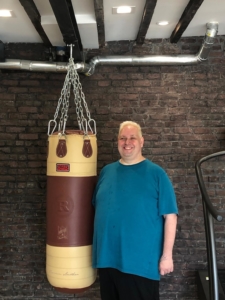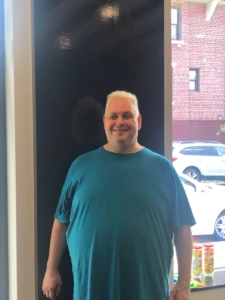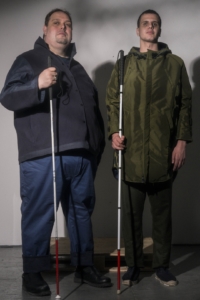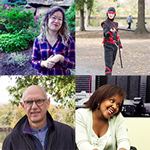Faces Behind the Screen: Gus Chalkias
Quick Links
<< Return to all “Faces Behind the Screen” stories
Gus Chalkias is an Assistive Technology Specialist at the Helen Keller Services for the Blind where he manages the Assistive Technology department.
He has two Master’s degree in Rehabilitation Counseling and Mental Health Counseling, which he uses to facilitate support groups and conduct individual counseling.
In addition to the work he does at Helen Keller Services, Gus is an adjunct professor at New York University. He teaches a class on assistive technology to software and mechanical engineers and occupational therapists in order to inform them on best practices for design choices.
Part 1
What are some of your responsibilities at Helen Keller Services?
I work with clients with vision impairments who are seeking to learn how to use technology in academic or professional environments. In addition to that, I supervise a staff of five for our technology department, which spans three different locations – one in Brooklyn, two on Long Island, one in Hampstead, Long Island and the other one in Ronkonkoma. So our staff is spread out over those centers.
I also do counseling both one-on-one and in group facilitation. Though, most of the time, it’s a small part of what I do here. I try to fit it in whenever I can. But the group facilitation is one of my favorite things to do.
I’m really blessed to be here. I’ve been an Assistive Technology Instructor for almost 20 years now. I started at the Computer Center for Visually Impaired People at Baruch College in 2001, and I worked there for a number of years and honed my knowledge of assistive technology. From there, I just looked for other opportunities and landed here.
What are some of your passions? What place does it hold in your life today?
Oddly enough, I love technology. I guess it’s not that odd.
I used to be an accountant before I lost my vision. I worked for eight years out of college as an accountant and I hated it. It was easy, good work, and the pay was great, but at the end of the day, it wasn’t satisfying or fulfilling for me.
When I started losing my vision in 2000, I fell into assistive technology – obviously for my own personal use. When I was training at the Computer Center for Visually Impaired People, I was also asked to come on as a tutor, and then eventually as an instructor, as staff, and so on. From there, it just took off.
I love gadgets and anything that is usable by me. Because I am a screen-reading user, anything that has accessibility functionality is super exciting to me.
One of my other passions is watching television. Some people may think that it’s kind of an odd thing. Do you mean blind people watch television? Yes, we do! I have multiple Apple TVs, Amazon Fire devices, and Amazon Alexas all over my house. It’s all “technologied” up. I love watching all kinds of TV shows and spending as much of my free time as possible binge-watching.
It’s not always the easiest thing to make time for TV because I’m really busy, and I’m really committed to not just staying at home. I like to keep a balance of a busy work life, a social life, but also a really busy downtime, making sure that I have enough downtime to binge-watch as much television as I can.
Do you use audio description?
I do and I have to be honest – I love it. I’m a huge fan of audio description. There are times when I don’t think it’s very good, so it can be a little frustrating in that regard. There are times when it’s not available and that also becomes really frustrating. I still watch TV shows that are not audio described, but if a show has audio description, I am super excited. Unfortunately, the only place I can really get that is on Netflix.
Hulu doesn’t have yet. Or if they do, it’s only on the web, and it’s not accessible to activate. So you have to have somebody sighted activate it. iTunes, which I have been trying to figure out for a long time, only has audio descriptions on movies, but not on television shows. So even if a TV program has audio description, it’s not available on iTunes with the audio description, which makes me nuts.
Sometimes I’ll go to a movie theater and that has mixed results, too, because those systems are not great a lot of the time. I understand that, depending on the program, the description has to fit inside of the dialogue, but sometimes it feels rushed.
What’s your favorite show to binge watch at the moment?
I am pretty caught up on all my shows, but the most recent show that I really enjoyed is Star Trek Discovery. It’s actually really good. I also really enjoyed Daredevil on Netflix. I’m really disappointed that it was canceled and I’m hoping that Disney will bring it back with audio description because it was fantastic. It was probably one of the best-done shows on television.
I watch a lot of TV, so it’s very hard to pick one. I watch standard stuff like Riverdale, The Chilling Adventures of Sabrina, and The Umbrella Academy. I just finished watching Dead To Me and What If on Netflix. Those were both fantastic. One is a dark comedy. The other one is kind of neo-noir mystery.
Netflix does a really good job with audio description. They have a lot of interesting international programming that is dubbed into English, but they don’t do audio descriptions in the dubbed languages. They only have audio descriptions in the original language. So I’m like I want to watch this show, but I don’t know Turkish. It’s something that I’ve noticed. I think if the show is really popular, they’ll do an audio description track in English. There’s a show from Turkey called Immortals that I’m really interested in watching, but there’s no audio description in any language other than Turkish. I’m not complaining because Netflix has really done a tremendous job in terms of creating access for people with vision impairments, but it’s definitely something that could be worked on.
Part 2
What is one device you can’t live without?
My iPhone. It has everything I need right in my pocket. It has my money identifier, GPS, email, and text messages. I can order from Amazon, watch Netflix, and, even to some degree, I watch Hulu on it, too. It’s just amazing. I love this little device. I don’t need a big 65-inch television. I just need good sound and I can get that from my iPhone. Is it my preferred place to watch television? No, but the fact that I can and I can take it wherever I am is pretty amazing.
But then again, at home, I really love my Apple TV. I love that the Grubhub app is on there so I can order food from my television. I don’t have to worry about clunky interfaces, because the Apple TV interface is pretty nice. I’ve seen a bunch of the newer smart TVs, but I think Apple is probably my favorite one at this point. Maybe it’s because I’m an Apple product user.
When did you start going blind?
I was born with a condition called Retinitis Pigmentosa, but I started to notice my vision changing around the age of 15. I was diagnosed when I was 17. I remember my doctor, at that time, gave me my diagnosis over the phone. One of the symptoms of RP is night blindness, at least initially. So my doctor said to me, “oh, I guess you better get used to staying home at night.” That was my introduction to blindness. For the next, I’d say, 10-11 years, I was in denial about the fact that it was happening.
In 2007, I was working as an accountant. I lived and worked in Astoria, Queens, so it was a very easy walk from my house to my office. Because my vision was changing, I got really scared about navigating outside of my comfort area. Over the course of those 10 years, my world really started to shrink and be encompassed with the 10 to 12 blocks between my office and my home. It was a very small world for a long time.
Then at 28, my vision changed from 20/200 to 20/400. I started having difficulty interacting with the spreadsheets and all the work I had to do. I eventually stopped working and started using a cane. I learned how to clean my home, cook, use the computer, and navigate safely.
It was a tough transition. I was unemployed for about a year, and it was probably the hardest year of my life. I look back on it now and it wasn’t necessarily because I was blind. It was because I didn’t feel productive. I’ve been working since I was 13 or 14 years old. I’ve always had work and as you can tell, I like to work. So my biggest struggle was the loss of independence and productivity.
Once I regained my independence, things started to improve for me. I remember telling myself at some point doing that year, “Gus, your biggest fear has come true. Now what? What are you going to do? You have two choices. You can go out and live your life, or you can crawl into a hole and wait to die.” That may sound extreme, but that’s what I told myself. I had too much left to give up.
With exposure to assistive technology and the world of the blind community that I interacted with within my work, I started to restructure. I’m happier as a blind person than I ever was when I was sighted, which I think a lot of people find really odd. But personally, I started to enjoy things and stopped taking them for granted after I lost my vision. I even have more friends and a better social life. I think I’m more myself now than I was when I was sighted. There’s a part of me that’s grateful for the vision loss. Obviously, if I had the opportunity to regain my vision, I would. But the vision loss helped me gain access to myself.
What’s the best thing about being blind?
Skipping the security lines at the airport and cab lines when I’m waiting and there are 50 people ahead of me! At the cab line, there’s a person who’s managing it who sees me with my cane. They’re like, “come up here”, and I’m like, “yes, score!” I call those perks because there are some perks to being blind.
The other thing I’ve found is that my vision loss enables me to unbiased by what’s visual. As a global community, I feel like we are so biased about what things look like and what people look like. My vision loss has removed that tendency that we have as human beings. I’m not going to lie and say that I don’t have biases, but I think the biases are not based on visuals. I think that’s been a really good thing for me.
What’s a common mistake sighted people make when interacting with blind people?
On multiple occasions, I’ve noticed that If I’m with a sighted companion at a restaurant or a bar, they would ask my companion, what I would like to drink or whether I like or dislike something as if I can’t speak for myself. It’s annoying because I’m just a person trying to live my life, but I feel like I have to advocate for myself. When I go out, I’m not trying to be a human rights activist but I feel like there are moments when I have to be like that. I understand that people don’t always interact with blind people on a regular basis. I don’t feel like they’re being malicious or mean-spirited, but I get really tired of having to deal with that.
I also dislike when people assume they know where I’m going. Sometimes people grab me and move me to wherever they think I’m going. I don’t like when people randomly touch me. First of all, identify yourself and ask for permission. Don’t just grab me like I’m a piece of furniture. I don’t appreciate that.
But again, that falls into this whole advocacy point. I don’t want to train people on how to interact with blind people. It’s not something that I want to do. It’s something I’ve had to do since going blind. Rationally, I understand it, but it’s emotionally draining.
If you could give some advice to sighted people on how to interact with blind people, what would it be?
If you want to do something for a blind person, ask for permission first. We are human beings. We have the right to say yes or no. Also, don’t get pissed off at me if I say no. I’ve had people get really pissed off at me when they offer me their seat on the subway and I decline.
The other thing is don’t interact with me like there’s something wrong. I just hate that my vision impairment is seen as a tragic thing. I’m not going to say it was an easy transition for me. It wasn’t, but my life is anything but tragic. My life is no different from anyone else’s. The only thing that’s different is that I can’t see.
Courtesy of the Ve Collection by Camila Chiriboga
Part 3
Can you describe a moment when you felt discriminated against because of your vision loss?
I’ve been really fortunate. I feel like I’ve had some really wonderful experiences over the last 20 years.
One time, I was working with this leadership training program and I requested to be the head of the program. Initially, they said yes, but about a week later, they said, “oh, we’re going to assign you to work with this person instead.” I know for a fact that they did that because I’m blind. They weren’t confident in what I was able to do as a blind person.
I owned the program and I ran it the way that I thought I could and should. I thought it was very successful, but it was a little disappointing for me to have to deal with that piece of it.
Then again, it’s all about interaction. Some people don’t have experience with blindness. They often don’t know what blind people are able to offer and are able to bring to a conversation. I bring a very different perspective, but that doesn’t make my perspective any less valuable than anybody else’s.
How do you overcome moments of adversity? What advice would you give someone who may be struggling?
Make sure that you have a strong support network of people that you can bounce things off of and talk with.
One of the things that I’ve historically struggled with is having a support network around me. When I try to do things alone, I often find that I fail or I get more frustrated. When I have a team of friends, family, and colleagues, it just makes things work better.
Collaboration is super important. I find that operating in silos doesn’t work for me. I need to be part of a community. Find the people around you that will support and encourage you, and that also tells you when you’re being a jerk.
Having a strong support network is probably the most important lesson I’ve learned over the last 20 years.
What was your experience like modeling for Camila Chiriboga’s clothing line?
It was really interesting. I did not expect to be selected as one of her subjects for the project. Because I’m a bigger guy and she’s a fashion designer, I assumed she would want somebody who’s thin and has a certain look. The fact that she chose to work with me really was surprising, but also wonderful. Camila was so loving and gracious, and she did a great job developing these beautiful clothes for me. I would love for her to do more.
It was really nice to work with somebody who included me. People who are bigger don’t always feel included in fashion, but Camila wanted to create an inclusive experience and it was amazing.
She designed a jacket for me that has two colors – navy blue and charcoal gray on the other side. The pants she designed were navy blue and electric blue on the other side. I like funky and colorful options.
People often say, “what do you care what color you’re wearing?” They have no idea. I love fun colors and being able to wear them. It’s important to know what I’m wearing.
Because I have tattoos. I color my hair. I just recently got introduced to a new shoe store that has these crazy colorful shoes. And I just spent a ton of money on new shoes from them that are in different colors. Just because I can’t see these things doesn’t mean I don’t have a sense of fashion or a sense of style that is my own. Typically, I would stick with black clothing, black shoes, black socks, and now, even my socks are different colors.
What is one of your proudest moments?
I would say finishing grad school. I graduated with two masters, one in rehab counseling and one in mental health counseling with a 3.96 GPA. It was an amazing experience to go through school again because when I was in college as an undergrad, I was not very studious. I didn’t want to be in school. I just went because it was expected of me.
When I went to grad school, I was 40 years old. I studied something that was really important to me. I think they need a lot more professionals within those fields because mental health is such a major issue. In particular, rehab counseling is important because people with disabilities are often left feeling less than or underestimated. Having a disability often brings on its own set of anxieties.
It’s not that things are impossible, but a lot of times, the anxieties are brought on by outside perception of the disability. So the barrier is not about me being unable to do the work, but that somebody might not believe that I can.
Also, in 2011, I won a dance contest which was really cool. A friend of mine and her husband were the chair people for the Sunnyside Boys & Girls Club in Queens, New York. They held an annual fundraiser that was modeled after Dancing with the Stars. They paired people from the community with professional dancers, so I joined and trained with my dance teacher for four nights a week. It was about five weeks long. The first three nights were mostly me crying because I couldn’t move the way that she was telling me to move. But, then we did it. We won first place! The fundraiser raised about $25,000 that night for the Boys & Girls Club.
So when it comes to technology, what are some everyday issues you run into that sighted people might not?
I would say poor web design. It’s frustrating when I go to a web page and it’s a series of images that are inaccessible.
If I’m going to a new restaurant, I’ll go online to look at their menu ahead of time so that I can figure out what I want. Oftentimes, the menu is an inaccessible PDF or JPEG that’s been thrown up on the website. For sighted people, those images work. It looks fine and people can read them. But for somebody who’s using a screen reader, those images aren’t great.
I also dislike when a webpage has way too much information. There’s no need to have a page that has 600 links. If it’s unorganized, it makes it really hard to find things.
Do you have a message for website creators or technology creators? And if so, what is it?
Just do the work. Read about accessibility. It’s not that much extra work. It’s just a matter of incorporating these things into your code. That way, when you launch the page, it’s accessible.
Going back and making things accessible retroactively is a pain in the ass. But if you handle it in the beginning, then you’re including more people and you’re allowing them to participate in whatever it is that you want to get out.
Why would you want to exclude a whole community of people from interacting with what you have to put out?
Do you have anything else you’d like to add or that you would like people to know about?
I often encounter people who are dealing with an onset of disability at a particular stage in their life. They view it as an ending to something or something that’s tragic. I’m not saying the transition is easy, but I would say find the opportunity. There’s always an opportunity and if we can find it, then we can actually be fulfilled by the things that we take on.
If we don’t find the opportunity, then everything else is just going to seem like a struggle. We spend enough time trying to get through life. Why make it harder for ourselves?
My vision impairment gave me access to a life that I did not imagine. I certainly would never have been an assistive technology specialist. I never would have gone to graduate school for rehab counseling and mental health counseling. I probably would have still been an accountant and miserable.
Losing my vision gave me access to the more authentic me, to the person that wasn’t angry about feeling stuck because I don’t feel stuck anymore.
—
Faces Behind the Screen would like to thank Gus Chalkias for participating in our storytelling project. If you’re interested in sharing your story with us, fill out our nomination form.
Faces Behind the Screen is a storytelling project focusing on members of the Deaf and hard of hearing community.






